


EDUCATION EXECUTIVE ISSUE 167 SO, IT’S OVER TO YOU NOW! The final article in Helen Burge’s year-long sustainability series
YOUR SCHOOL The key points Phil Burton has learnt about fire safety Supporting business and f inancial excellence in schools and academies January 2023 THIS NEW YEAR IS ALL ABOUT YOU How to place more emphasis on your happiness this year TRANSFORMING YOUR SCHOOL’S VISUAL BRAND Advice on innovating and developing your school’s branding 2023 WE’RE BACK ON MAY 18TH IN MANCHESTER AND JUNE 7TH IN LONDON Flag your interest for discounted tickets by emailing hello@ edexeclive.co.uk EXPERT-LED SEMINARS, VALUABLE NETWORKING, INNOVATIVE EXHIBITORS Visit www.edexeclive.co.uk to learn more A day of interactive learning and networking specifically tailored to the role of the SBL
FIRE SAFETY IN



2023
LIVE
Visit www.edexeclive.co.uk to learn more Standard ticket price is £50 which includes all seminars, exhibition, refreshments and a hot lunch A day of interactive learning and networking specifically tailored to the role of the SBL Flag your interest for discounted tickets by emailing hello@ edexeclive.co.uk WE’RE BACK ON MAY 18TH IN MANCHESTER AND JUNE 7TH IN LONDON
“EdExec
is a great way to network with other colleagues in different authorities, when you return to work you feel you are not alone juggling your workload. The whole day was very well organised with very interesting seminars and had a good range of outside agencies with interesting products.” – 2022 delegate
NEWS REPORT
DfE launches Prevent duty self-assessment: safeguarding children and young people from radicalisation
So, it’s over to you now!
10
SO, IT’S OVER TO YOU NOW The final article in Helen Burge’s year-long sustainability series 14

Fire safety in your school
26
Somerset
Somerset charity believes social media contributing to Learning Trust and said 76% of the children works with have anxiety, while 54% have depression, and 41% have had suicidal thoughts. The charity said parents were “at total loss” as to how to show that social media has a negative impact on particularly teenagers,” said Dr Tim Williams, former medical director of specialist service at the Avon and Wiltshire Mental Health Partnership, “but there is some evidence to show there is no
SWITCHED ON
The latest news and views from the world of ICT and edtech 28
30
LIVE IT
Close your eyes. Inhale. Count to five… now exhale. Time to take a few moments out for some light and interesting reading – a well-earned break from numbers and statistics 32

SPOTLIGHT ON: Local authority and school expenditure 2021-22
EDEXEC LIVE 2023: A DAY YOU WON’T WANT TO MISS Find out more about our sector leading event 16


WHAT WINEMAKERS CAN TEACH US ABOUT ORGANISATIONAL LEADERSHIP –PART TWO What SBLs can learn from the process of winemaking 18
THIS NEW YEAR IS ALL ABOUT YOU How to place more emphasis on your happiness this year
23

FIRE SAFETY IN YOUR SCHOOL The key points Phil Burton has learnt about fire safety 24
NEW YEAR RESOLUTIONS Why Sue Birchall is doing hers differently this year
HOW TO EVALUATE YOUR IT PROVISION Neil Limbrick gives his top tips 29




TECHNO GEEK Save time - automate your admin
WHAT TO DO WHEN IT IS ‘NOTSUCH-A CRISIS’ Putting formal procedures in place for those ‘lesser’ events
In a time where budgets are tightening and schools are being expected to do more with less, there’s never been a better time to attend an event dedicated to helping you skill-up and share best practice with colleagues.

EDUCATION EXECUTIVE TO YOU NOW! Supporting business and inancial 2023 WE’RE BACK ON MAY 18TH IN MANCHESTER AND JUNE 7TH IN LONDON Flag your interest for discounted tickets by emailing hello@ edexeclive.co.uk EXPERT-LED SEMINARS, VALUABLE NETWORKING, INNOVATIVE EXHIBITORS Visit www.edexeclive.co.uk to learn more A day of interactive learning and networking specifically tailored to the role of the SBL NEWS & VIEWS LEADERSHIP BY EXAMPLE MANAGEMENT
Contents
the cover
LIVE 2023
ICT MATTERS LIVE IT
On
EDEXEC
DfE launches Prevent duty self-assessment T his new tool, developed in collaboration with edtech charity LGfL, provides schools and improvement, the tool helps schools to assess how well policies and practices are embedded, and identify any challenges, gaps and areas of weakness. The self-assessment tool helps of continuous review and improvement. Use of the tool is not mandatory but contains both requirements and recommended good practice activities to education inspection framework grading; senior leadership teams and designated safeguarding leads simply gather and input evidence for the seven areas outlined that enable them to accurately review their Working in partnership. Training. Online safety. Safeguarding school premises. Building children’s resilience to wider school community is crucial. This is particularly important for the online safety section, in light of the government’s guidance Keeping Children Safe in Education, which advocates whole communication; unless all stakeholders are involved, and staff know what others are doing – including technical teams – there will be gaps. The same applies if policy does not reflect practice,” said the spreadsheet should be robust and include actions, details and dates,” she said. “Results can then be incorporated into the school’s Prevent and school development plans and shared with Self-Assessment Tool for Schools please www.gov.uk/government/ publications/prevent-duty-selfassessment-tool-for-schools The Prevent guidance applies local-authority-maintained schools academies; non-association independent schools; registered early years settings. responsibilities in line with: and Security Act 2015 (CTSA) Online safety requires consistency, common understanding and clear communication The Department for Education has released its new Prevent Duty Self-Assessment Tool for Schools –an easy-to-use resource designed to help designated safeguarding leads and wider senior leadership teams implement the Prevent duty to safeguard children and young people from radicalisation and extremism Do you check that the fire doors are all open, even the ones that never get used?
PHIL BURTON SBM at Hallbrook and Cosby Primary Schools, uses his recent experience to summarise some of the key points he has learned about fire safety A am completing the NEBOSH Fire Safety Certificate and am thinking bad position; in fact, would go as far as to say we are in very good position. However, attending this course has made me think about things so, with that in mind, felt it might be Firstly, have you ever heard of the Regulatory Reform (Fire Safety) Order 2005? (RRFSO) Of course you have, hear you say. This the legal framework which details everything you need to every page. Your school will have responsible person, usually the headteacher who is accountable for ensuring that every detail the RRFSO is adhered to. (depending on the severity of the incident). They have in the region of 50 articles to ensure are met in your school. It impossible for me to go through everyone one, but here are the five key bits think are worth knowing. 1 You must complete suitable and sufficient fire risk assessment for your annually internally and then either every five years externally or if major changes occur to the building or people within the five-year time frame. 2 You must have detailed evacuation emergency. These procedures should be tested at least twice a year although most schools will do this termly in
Whilst fire relativity uncommon, does You can find more your responsibilities by searching the RRFSO2005 and reading through everything that needed. January 2023
the form of fire drill. Remember to log and record 3 sure that your corridors and escape routes are kept clear from obstruction at all times. Do you check that the fire doors are 4 brigade and they take with them the grab bag which has all the key pieces plans, areas where there may be higher risks, such as LPG cylinders, locations 5 Ensure you are doing some training with your staff on fire safety. This will be the form of induction, annual refreshers, and then feedback after incidents such as drills. Make sure you iceberg when comes to fire safety done and everyone should play part in ensuring the safety of others.
In the final article of her year-long series focusing on each part of the Eco Schools Award, deputy COO at The Priory Learning Trust, now hands over to you to take action after offering all of her advice over the last 12 months Ithe north facing room feel cooler. Most of the year, the room is too cold but, in July, it was just as unbearable as the rest of the house. The incredibly high, extreme temperatures we experienced last summer are the result of relationship with the earth is under threat. England had its driest July since 1935 and, for the south-east and central southern England, has been the driest July since 1836. The world has warmed by about 1.1°C since flooding because, when does eventually rain, the ground is so dry that rainwater can’t soak through, and sits on the surface instead. We know we need to stop greenhouse gases being pumped out, further heating up the are balanced by those removed from it. The DfE launched their Sustainability and
Climate Change Strategy in April 2022; their vision is for the UK to be the world-leading
ICT MATTERS NEWS
mental health charity concerned about children and young people on social media SWITCHED ON The latest news and views from the world of ICT and edtech Acquisition adds up for Cambridge edtech Blutick Business Weekly, AQA – the UK’s leading assessment organisation has acquired Cambridge-based AI platform Blutick which supports the teaching, learning and assessment at Key Stage 3, GCSE and A-level maths. Blutick, founded by Rob Percival in 2019, and backed by Cambridge Angels, has The AI-driven app features functionality that guides students through mathematical concepts, reviewing and correcting their workings and responses to maths questions in real-time. Students are also supported with access to worked examples line-by-line analysis of typed answers. The app is designed to reduce teacher workload and deliver meaningful reports on student progress and attainment. AQA will provide the app and online mocks to schools items and enhanced functionality.
20
TRANSFORMING YOUR SCHOOL’S VISUAL BRAND Advice on innovating and developing your school’s branding 06 NEWS Latest school business management news in brief 08
09
Editor’s comment
Happy new year! I hope you all had a wonderful break over Christmas and have entered the new year feeling recharged, motivated and full of optimism (and probably full of cheese and chocolate too!) The start of a new year is a great time to set goals and resolutions with a positive mindset, but it can also be a tough time of year with a post-Christmas comedown combined with rainy, dark, days. The SBL community is a great support system to have, so reach out on Twitter using the hashtags #sbltwitter and #sblconnect to link up with your fellow colleagues and share your successes, challenges or just a funny a GIF to lift the January blues!
Instead of feeling blue, we kickstart the first issue of the year with green in mind. After a year-long series focusing on each part of the Eco Schools Award, this January issue features the final article from Helen Burge who hands responsibility over to you; her articles over the last 12 months have given you all the tools you need to achieve sustainable success in your school.
In the second article in his series on winemakers and organisational leadership, David Carne explores why both SBLs and winemakers have curiosity, creativity and time-management in common and, with the new year in mind, Laura Williams explains why this is the year to truly start going after what you want, what you desire and what will make you happy.
Sue Birchall is also focused on the new year and she tells us why she is doing her resolutions differently this year. Could this new year also be a good opportunity for a new look? I’m not talking about a new hair colour or a new pair of shoes, but something even more exciting…new school branding! Simon Hepburn shares his ideas on how you can innovate and develop your school’s branding.
Switching to all things ICT, Neil Limbrick discusses how best to evaluate your IT provision and Nigel Milligan explains how you can automate your admin to save yourself some muchneeded time.
As always, we’d love to hear any suggestions you have for the magazine. If you want to get involved with EdExec, or if you’d like us to cover a certain topic, please do let us know. Contact eleanor@intelligentmedia.co.uk or tweet @edexec with ideas, opinions or success stories.
Education Executive is the first business management magazine written exclusively for school business managers and bursars, bringing you the latest issues affecting your role, from finance to premises, procurement to HR. EdExec delivers the lowdown on all the hottest topics in education management right here, every month.
Design Graphic designer Amanda Lancaster alancasterdesign.com
Editorial Editor Ellie Potter eleanor@intelligentmedia.co.uk Sales info@intelligentmedia.co.uk
Publisher Vicki Baloch vicki@intelligentmedia.co.uk
info@intelligentmedia.co.uk
Education Executive is published by Intelligent Media Solutions Intelligent Media, 115 Mare Street, London, E8 4RU Tel 020 3794 8555 | Fax 020 3794 8554 Email
Web
ELEANOR POTTER EDITOR We want to hear from you! Is your school doing something wonderful? Do you have an opinion or experience you’d like to share? A story suggestion? Or some advice you’d like to share with your peers? Get in touch – email eleanor@intelligentmedia.co.uk GET YOUR DAILY DOSE OF SBM NEWS, ADVICE AND GUIDANCE AT WWW.EDEXEC.CO.UK
www.intelligentmedia.co.uk @EdExec
Contributors
The education sector can be difficult to navigate at times, and those in school business management play a pivotal role in steering schools to success. Tasked with everything from finance and procurement, to HR and admin, you keep the education cogs turning. Education Executive addresses the most pressing matters faced by SBMs, offering meaningful insights and practical advice – essentially, all you need to run your school. Our contributors, drawn from the Education Executive team and sector innovators and experts, offer invaluable business insights from both the sidelines and front line.
 ELEANOR POTTER
ELEANOR POTTER


Editor Education Executive

DAVID CARNE School business professional and executive coach CardinalGriffinCatholicCollege



NIGEL MILLIGAN IT technician manager StHerbert’sRCPrimarySchool
PHIL BURTON Business manager HallbrookandCosbyPrimarySchool


EDUCATION EXECUTIVE NEWS STORIES RESOURCES EXPERT BLOGS
SUE BIRCHALL Long-standing SBL
HELEN BURGE Deputy COO ThePrioryLearningTrust LAURA WILLIAMS Director L J Business of Education
SIMON HEPBURN Founder MarketingAdviceforSchools
NEIL LIMBRICK Founder theEducationCollective
School leaders report rise in pupils not on free meals going hungry
As reported in The Guardian, more than half of school leaders in England are seeing more pupils who cannot afford a meal at lunchtime yet are not eligible for free school meals, according to a survey. Research by the Sutton Trust, an educational charity, found clear signs that the cost of living crisis was increasingly affecting young people’s education, with a growing number of pupils arriving at school tired, cold and hungry.

Nearly three-quarters (74%) of state school teachers who took part in the poll said they had seen an increase in the number of pupils who were tired or unable to concentrate, while more than half (54%) said more children were coming to school without adequate clothing, such as a warm winter coat. More than two-thirds (67%) have students with behaviour issues, 38% said they were seeing growing numbers of children coming to school hungry, and 17% reported an increase in families asking to be referred to food banks.
Despite the cost of living crisis, the government has resisted pressure to widen access to free school meals (FSM). According to the Sutton Trust, 52% of senior leaders in state schools saw an increase in the number of non-FSM children unable to afford lunch during the autumn term, rising to 59% of those in the most deprived schools.
In these schools, almost three-quarters of teachers (72%) said financial pressures were affecting the ability of at least a third of their classes to succeed in school, with pupils in the north west, Yorkshire and the north east more likely to fall into that category than those in the south east.
@SoVeryBritish: Another exhausting day of winging it. Well done, all.
Absent pupils to be helped rather than punished
BBC News has reported that children missing from school for long periods will be supported, instead of being punished, under a new pilot programme in Glasgow. Overall school attendance has dropped across Scotland since the disruption of the COVID pandemic.
Under the new scheme psychologists and community workers will visit homes to help pupils overcome anxiety, stress and mental health issues. The project is being launched across all of Glasgow’s schools next week.
The 12-month pilot will, initially, target children who attend school less than 60% of the time and is expected to work, one-onone, with at least 250 pupils from secondary and primary schools. The scheme, called REACH, is being run jointly by Glasgow City Council and the charity Quarriers. The Scottish government said it was providing local authorities with funding to help with poor wellbeing and mental health.
Glasgow City Council’s principal educational psychologist, Barry Syme, said said the term “emotionally-based school non-attendance” was used to describe when a child feels unable to attend school because of stress or other wellbeing barriers.
@susie_dent: Word of the day is ‘growlery’ (1853, from Charles Dickens) - a place you retreat to for the purposes of growling, muttering and letting off steam.
He explained that the aim of the pilot project was to intervene early to support young people and help divert them from the adult mental health system, much worse outcomes and more expensive interventions. “Instead of looking at it as a problem, and punishing families for nonattendance, we looked at the underlying reasons for that.”
06 January 2023 NEWS AND VIEWS NEWS
NEWS
The latest news and views from the world of education
School staffing a chronic issue, says union
The National Education Union believes Guernsey schools are suffering from a growing staff shortage. Paul Montague, of the National Education Union, said there was a “chronic ongoing recruitment issue...It’s particularly bad at the moment and something definitely needs to be done.”
Liz Coffey, executive principal of the Secondary School Partnership, said there was not a “wholesale recruitment issue”. Montague spoke after concerns raised by a parent about staffing at St Sampson’s High School; the parent, who wanted to be anonymous, said the “system is broken” and “they don’t have the staff”.
Montague said: “I fully accept that people are working as hard as they possibly can to fill these gaps. We do have some very good agency staff but, understandably, agency staff are only here for one term. Sometimes we manage to extend that to a year, but it’s still not what’s required in terms of benefiting the youngsters in terms of their education.
“We have so many youngsters whose progress in a particular subject area has been blighted because they’ve had a massive turnover in staff and I just don’t think it’s acceptable.”
Albanian children facing racist bullying due to UK asylum row, says envoy
Albanian children are being subjected to racist bullying in UK schools because of the debate surrounding arrivals by small boats, the country’s ambassador in London has said, The Guardian has reported. Qirjako Qirko spoke out after Albanians were singled out by ministers, and sections of the media, during the recent rise in the number of his country’s citizens travelling across the Channel to claim asylum in the UK.
He called for an end to the “campaign of discrimination” and warned against reinforcing negative stereotypes. His comments appear to be aimed at the UK government after Suella Braverman, the home secretary, singled out ‘Albanian criminals’ during a debate on the crisis.
Qirko said more than 140,000 Albanians living in the UK had been negatively affected by the debate, which was “reinforcing negative stereotypes and racism”.
More than 5,000 children ‘persistently absent’ from




Bury schools
Figures published by the Bury Council reveal that a fifth of students in the borough were persistently absent from school, according to the Bury Times. Persistent absence is defined as missing 10% or more sessions - which would equate to missing a minimum of 14.5 days over the school year.
Under this criterion a fifth of Bury pupils - more than 5,000 - missed, on average, almost three weeks of learning time in schools. Education chiefs in the borough said “absence is too high” and that they were committed to getting the level of attendance at school back to pre-pandemic levels. The figures also show that total absence from school has risen by more than three days a year, per pupil, since the pandemic.

“This campaign of discrimination against Albanians living here in the UK should stop. There are people, especially youngsters, who are bullied in their schools because they are Albanians. Everyone who is responsible for this activity should apologise,” he said.
@OpsMgrWCSA: On the list of ‘random things I have done today as a school ops manager’ filling in the gov’s Sheep and Goats Annual Inventory #sbltwitter #sbl #opsmanager #operationsmanager
07 January 2023 NEWS NEWS AND VIEWS
DfE launches Prevent duty self-assessment
This new tool, developed in collaboration with edtech charity LGfL, provides schools with a practical overview of areas to consider throughout the school year. By encouraging a cycle of continuous review and improvement, the tool helps schools to assess how well policies and practices are embedded, and identify any challenges, gaps and areas of weakness.
The self-assessment tool helps schools to understand how wellembedded their existing policies and practices are, and to encourage a cycle of continuous review and improvement. Use of the tool is not mandatory but it contains both requirements and recommended good practice activities to meet those requirements.
It comes complete with a spreadsheet and guide and follows the Ofsted education inspection framework grading; senior leadership teams and designated safeguarding leads simply gather and input evidence for the seven areas outlined that enable them to accurately review their strengths and areas for development:
● Leadership and management.
● Risk assessment.
● Working in partnership.
● Training.
● Online safety.
● Safeguarding school premises.
● Building children’s resilience to radicalisation.
To be effective, consultation and dialogue with students, staff and the wider school community is crucial. This is particularly important for the online safety section, in light of the government’s guidance in Keeping Children Safe in Education, which advocates a whole school approach.
“Online safety requires consistency, common understanding and clear communication; unless all stakeholders are involved, and staff know what others are doing – including technical teams – there will be gaps. The same applies if policy does not reflect practice,” said Mubina Asaria, safeguarding consultant with LGfL.

“The evidence schools record on the spreadsheet should be robust and include actions, details and dates,” she
said. “Results can then be incorporated into the school’s Prevent and school development plans and shared with governors and trustees to help them fulfil their duties.”
To download your free Prevent Duty Self-Assessment Tool for Schools please visit: www.gov.uk/government/ publications/prevent-duty-selfassessment-tool-for-schools
The Prevent guidance applies to schools in England identified in Ofsted’s education inspection framework, including:
● local-authority-maintained schools
● academies;
● non-association independent schools;
● registered early years settings.
The self-assessment tool has been designed to assist schools in England to review their Prevent-related responsibilities in line with:
● Section 26 of the Counter Terrorism and Security Act 2015 (CTSA)
NEWS AND VIEWS NEWS REPORT
08 January 2023
Online safety requires consistency, common understanding and clear communication
The Department for Education has released its new Prevent Duty Self-Assessment Tool for Schools –an easy-to-use resource designed to help designated safeguarding leads and wider senior leadership teams implement the Prevent duty to safeguard children and young people from radicalisation and extremism
SPOTLIGHT ON
Local authority and school expenditure 2021-22
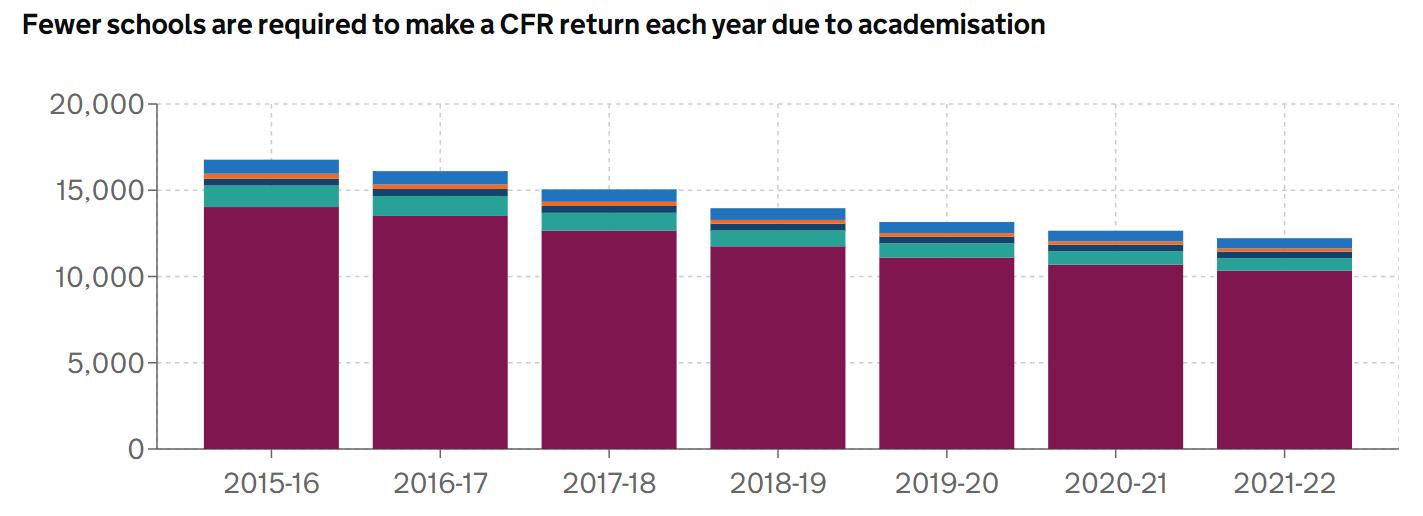
It also includes expenditure by local authorities (LAs) on schools, education and community services, and children’s and young people’s services.


HEADLINE FACTS
AND FIGURES: 2021-22

Total income of LA maintained schools (£ billion) £24.1 1.8% higher than 2020-21
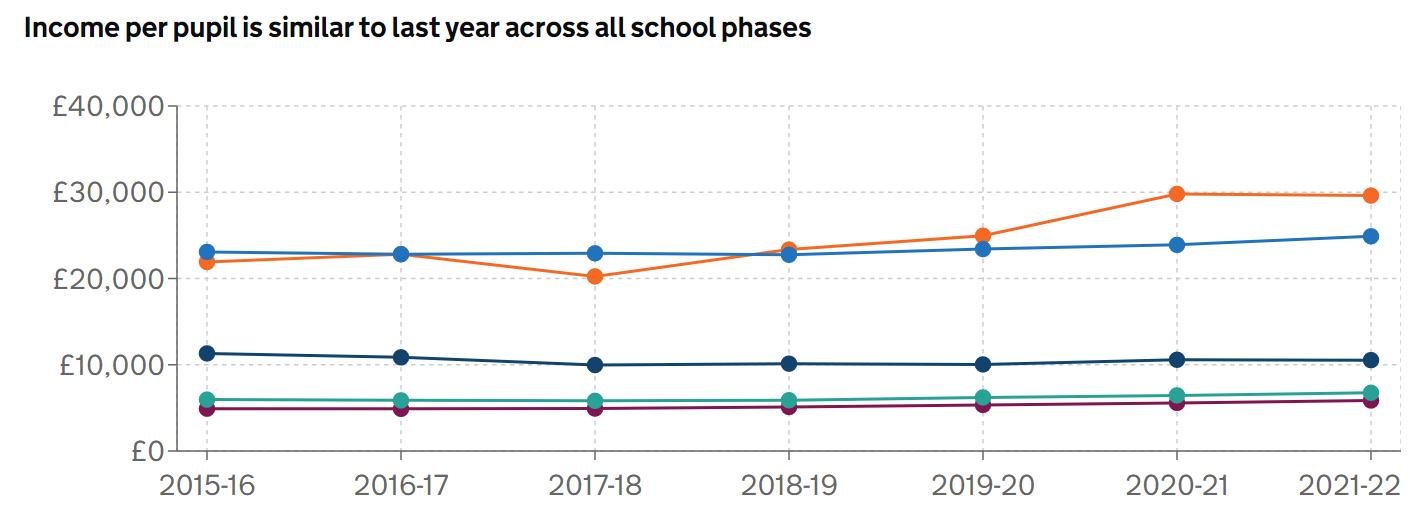
Total expenditure of LA maintained schools (£ billion) £23.9
4.0% higher than 2020-21
Percentage of LA maintained schools in deficit 8.8%
0.4 percentage points higher than 202021
Expenditure by local authorities on schools (£ billion) £28.8
4.9% higher than 2020-21
Expenditure by local authorities on other education (£ billion) £3.5 14.9% higher than 2020-21
Expenditure by local authorities on children’s services (£ billion) £11.9
7.4% higher than 2020-21
This DfE release contains information on income, expenditure, and revenue reserves of local authority maintained schools for the financial year 2021-22
09 January 2023 SPOTLIGHT ON NEWS AND VIEWS
So, it’s over to you now!
In the final article of her year-long series focusing on each part of the Eco Schools Award, HELEN BURGE, deputy COO at The Priory Learning Trust, now hands over to you to take action after offering all of her advice over the last 12 months



Istarted writing this article in the height of summer in my front room, with the windows and curtains closed in an attempt to make the north facing room feel cooler. Most of the year, the room is too cold but, in July, it was just as unbearable as the rest of the house. The incredibly high, extreme temperatures we experienced last summer are the result of climate change, according to climate scientists, and they are predicting more and longer heatwaves in the future.
This is a stark reminder that our relationship with the earth is under threat. England had its driest July since 1935 and, for the south-east and central southern England, it has been the driest July since 1836. The world has warmed by about 1.1°C since the industrial revolution 200 years or so ago when humans started pumping greenhouse gases into the atmosphere.
When we get these prolonged periods of heat, we are more likely to have other extreme weather - like droughts and then flash flooding - because, when it does eventually rain, the ground is so dry that rainwater can’t soak through, and sits on the surface instead. We know we need to stop greenhouse gases being pumped out, further heating up the earth’s atmosphere. The UK government has committed to net zero by 2050, meaning that the greenhouse gases going into the atmosphere are balanced by those removed from it.
HOW ARE THE DFE RESPONDING?
The DfE launched their Sustainability and Climate Change Strategy in April 2022; their vision is for the UK to be the world-leading education sector in sustainability and climate change by 2030, and they have the following four strategic aims:
10 January 2023 LEADERSHIP BY EXAMPLE SUSTAINABILITY
1Excellence in education and skills for a changing world: preparing all young people for a world impacted by climate change through learning and practical experience.
2 Net zero: reducing direct and indirect emissions from education and care buildings, driving innovation to meet legislative targets and providing opportunities for children and young people to engage practically in the transition to net zero.

3 Resilient to climate change: adapting our education and care buildings and system to prepare for the effects of climate change.
4 A better environment for future generations: enhancing biodiversity, improving air quality and increasing access to, and connection with, nature in and around education and care settings.

HOW COULD WE RESPOND?
Does your school’s sustainability strategy reference the DfE’s strategic aims or key actions areas? Do you have a named sustainability lead in your school? Remember that, just like safeguarding and health and safety, sustainability is everyone’s responsibility. If that is not the case in your school, how can you change the culture so everyone recognises it is their responsibility? It might help you whilst establishing the sustainability agenda within your school to consider stakeholder mapping, so you can identify the people with high influence and a high stake.
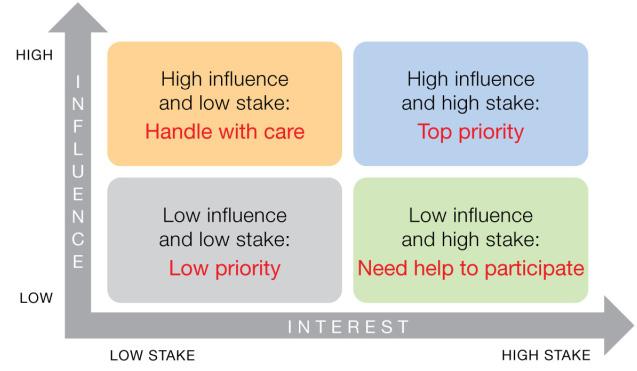
11 January 2023 SUSTAINABILITY LEADERSHIP BY EXAMPLE
ACT!
There will have been suggestions in this sustainability series which you know will either work really well or not at all in your school, for a variety of reasons; identify the quick wins and major projects which will have the maximum impact on reducing your school’s carbon footprint. It can be helpful to plot out the possible actions into an action priority matrix to help focus leadership’s attention, like this:
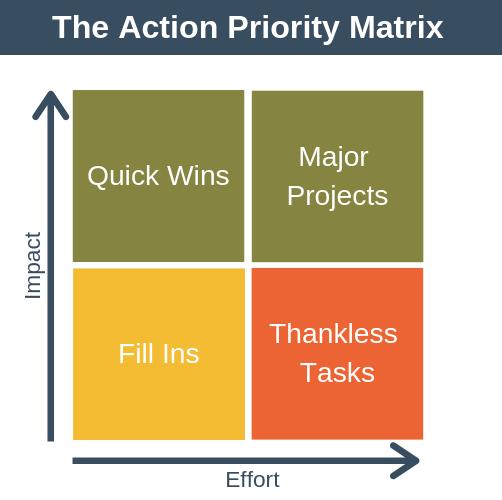
suggest they need at least 25 minutes; ● change the menu; ● then measure progress.
This could be a school-wide project involving many curriculum areas including food tech, maths, science, art, business studies, religion and ethics. Other quick wins include labelling general waste bins with a sign saying something like, ‘This is going to landfill!’ and, of course, don’t laminate the sign... ditch the laminator!
SHARE!
Share the progress which has been made, and the sustainability goals you are trying to reach with your school community – you might inspire others to change their behaviour and also inspire new initiatives for your school to embed. I also love hearing of #GreenSBL ideas from other schools, so don’t be shy, share them!
The UK Schools Sustainability Network (UKSSN) Ops Group is a growing network of school business leaders and governors who meet regularly to share good practice in sustainability in schools. It’s co-chaired by Paul Edmond, CFO, Heart Academies Trust, and myself.

For example, decarbonising your heating system is likely to be a major project which will take time and funding, but reducing food waste could be a quick win, one which everyone can get involved with. Start with measuring the food waste – what percentage is uneaten or edible food? Then introduce the following actions:
● serve smaller portions of food on smaller dishes;
● give students enough time to eat; studies
Please email opsgroup@ukssn.org.uk to join us and follow us on LinkedIn (UKSSN Operations Group) and Twitter (@UKSSN_OpsGroup).
UKSSN is hosted and supported by Global Action Plan; for more information take a look at https://www.transform-our-world.org/ukssn/ about-ukssn
Best of luck with it all – I hope you manage to make a difference in your school and in the lives and outlook of the young people who make that difference with you – our future wellbeing depends on it!
12 January 2023 LEADERSHIP BY EXAMPLE SUSTAINABILITY
Identify the quick wins and major projects which will have the maximum impact on reducing your school’s carbon footprint



Staff Absence Protection Become an Education Mutual member 0 1 6 2 3 2 8 7 8 4 0 Free Healthcare services Stress Protection Webinars and training workshops Increased Occupational Health services Legal services for schools M E M B E R S H I P I N C L U D E S : e way to manage staff absence protection for Schools and Trusts. Contact us: MORE INFORMATION educationmutual.co.uk Our market leading staff absence protection provides budget certainty, along with flexibility of cover. We operate
schools, for schools' approach, with
year end surpluses being returned
the education sector.
reinvested. mended by DfE CPC Framework
on a 'by
all
to
To date, over £800,000 has been
2023 A day you won’t want to
miss!
In a time where budgets are tightening and schools are being expected to do more with less, there’s never been a better time to attend an event dedicated to helping you skill-up and share best practice with colleagues


Think of the events as live versions of our magazine; you will be presented with a huge variety of relevant, tangible information that you can actually use to your advantage back at school. Our seminars are dedicated to the issues that affect you and your role most, offering insights into topics such as benchmarking, whole-school wellbeing, confident leadership and smart budgeting.
YOUR DAY, YOUR WAY
EdExec LIVE is one of the only events that allows you to build your own itinerary and select only the seminars that are of interest
to you and your school, ensuring the maximum value from the day. By selecting specific seminar topics relevant to you, you can be sure that your day will be filled with information and learning that will be directly relevant to you and your school’s current requirements.
It’s always difficult to take a day out of the office, but the question is: can you afford to miss out on these events?
ALL OF YOUR RESPONSIBILITIES, IN ONE PLACE
We champion the worth of thought leadership and strategic working and we

LEADERSHIP BY EXAMPLE EDEXEC LIVE 14 January 2023
WE’RE BACK ON MAY 18TH IN MANCHESTER AND JUNE 7TH IN LONDON
also know the importance of practical advice on day-to-day issues. With sessions on CPD, human resources, whole school planning as well as subjects like funding and policy, we’ll give you the tools you need to save your school money.
Sessions cover finance, procurement, leadership by example, wellbeing, community engagement, CPD, innovative ICT, staff management, academy and more…
Keep an eye out for the fantastic speaker line-up we have to offer you which we will be announcing in the coming weeks!
TAILORED TO YOUR SCHOOL AND SITUATION
The beauty of the live event is that you have the ability to choose the seminars you attend, ensuring the content is even more relevant for your specific school and unique situation. You know the challenges you and your school face better than anyone, so we provide you with the opportunity to learn more about the areas you need to skill up in in order to further the improvement of your school.
One thing that is universal to all schools at the moment is the fact that budgets are tightening, expectations are increasing, and schools are being forced to do more with less. EdExec LIVE aims to bring together innovative solutions that will help you strengthen your school’s position – now



and in the future.
No one knows the business of running a school better than those who do it, but we know how difficult it is for you to find the opportunity to leave the office; it’s well worth the effort, because EdExec LIVE is a fantastic opportunity to network with others in the profession, share experiences and solutions and forge long-lasting professional relationships to benefit you and your school.
SO, WHAT ARE YOU WAITING FOR?
Join us in Manchester on May 18th or London on June 7th for a day you won’t want to miss.
Get in touch with us now by flagging your interest for discounted tickets by emailing hello@edexeclive.co.uk
*Standard ticket price is £50 which includes all seminars, the exhibition, refreshments and a hot lunch.
EDEXEC LIVE LEADERSHIP BY EXAMPLE January 2023
your
for discounted tickets by emailing hello@
Flag
interest
edexeclive.co.uk
15
Our seminars are dedicated to the issues that affect you and your role most
What winemakers can teach us about organisational leadership –part two

In part two of his series on winemakers and organisational leadership, DAVID CARNE, school business professional and executive coach, explores why both SBLs and winemakers have curiosity, creativity and time-management in common

In part one of this article we looked at how, like winemakers growing vines, school leaders need to ensure that we match the context of our school, have deep character roots, create the conditions for success, continually maintain our organisations and are committed to serving our organisations for the long term. In this article, we’ll explore what we can learn from the actual process of winemaking.
IT ALL STARTS WITH CURIOSITY
Winemakers love wine. That is, perhaps, unsurprising, but they are also curious about wines. A good winemaker will taste other wines, learning about the styles, and the methods others used to create them.
School leaders, too, must be curious; too often schools can become inwardlooking and overlook the creativity and innovation that is going on in other institutions. Being curious involves accepting that there may be other, better, more innovative, ways of working and opens us up to possibility.
CREATIVITY AND CALCULATED RISK-TAKING
I am very privileged to have developed a friendship with a winemaker, called Szilard, who lives in a small village in Hungary. Szilard is a great experimenter. Unlike, many of the other village winemakers, he likes to put his own innovative take on the wines he produces. He respects the history and terroir, but isn’t afraid to innovate for the future. He takes calculated risks. This creativity, and willingness to take risks, is essential in school leadership. You can rarely ever know with 100% certainty the outcome of any given action - but sometimes you have to take it anyway. As leaders, we also need to provide a sense of safety for others to feel confident to take calculated risks, coaching them through their mistakes and failures; the alternative is an organisation too afraid to ever try anything new.
GETTING THE TIMING RIGHT
Another thing winemakers are experts at is getting the timing right. When do you pick the grapes to get the flavour

you want in the wine? How long do you ferment the wine with its skins? How long do you continue to let the wine ferment after that - and how long do you age it in barrels to get the depth of flavour you are looking to achieve? The same is true of school leaders. You can try the right thing at the wrong time and fail - the strategy was right, but the people were not ready for it. Conversely, you can delay too long and not achieve the result you hoped for. We need to be able to read our organisations to know when to act.
MIXING AND BALANCING
Good wine is not just about one thing, it is about the combination of hundreds of elements coming together in a balanced way. Winemakers balance acidity, sweetness, tannins, flavours, alcohol levels and may even bring two or more wines together to create a blend. School leadership is much the same. We want to get the right mix of staff, of initiatives, of communications to engage parents,
16 January 2023 LEADERSHIP BY EXAMPLE ORGANISATIONAL LEADERSHIP
investment in the right resources and training and development.
One of the great benefits of integrated curriculum financial planning is that it challenges us to consider this balance. School leaders need to be able to consider the needs of all pupil groups, build a balanced curriculum, bring together the right staff and know how to mix those ingredients in a way that means it is more than the sum of its parts.
MORE THAN JUST A NUMBERS GAME
Winemakers, like school leaders, love measuring and evaluating what the numbers are telling them about their wine. The numbers matter, but you can still create a bottle of wine that has the numbers right yet tastes awful. As a school business leader numbers are a big part of my professional life; I’m a strong advocate for integrated curriculum financial planning, and benchmarking, and I am interested in the impact of our resource utilisation
on outcomes. However, sometimes it is necessary to look beyond the numbers. You have to actually taste the wine and see if it is any good. In a school context, you have to check whether what you are doing is actually working for the pupils and the staff - and that means speaking to people, listening to what they are telling you and being open to constructive feedback. It also means having the humility to accept that you do not have all the answers, but the people around you may.
NOT EVERYONE WILL LIKE WHAT YOU DO
When people learn that I have a bit of knowledge about wine they often ask what the best wine is. I tend to reply that, while there are technically brilliant wines, the best wine is the wine you like. Winemakers do what they do because they are passionate about their wines, the processes they have used, the varieties they work with and the styles they create. However, there will always be people who do not like their wine.
The same is true of leadership styles and organisations, and that is okay. We have to accept that education does not have a ‘one-size-fits-all’ approach, and people who do things differently are not somehow lesser or inferior. Comparing a Château Patris to a bottle of Cristal makes no sense - they are completely different styles of wine - but they are both good wines. It’s great to be passionate about what we do, to take great pride in it and to have confidence in it, but we do need to guard against arrogance and complacency.
As a leader, if people don’t like what you do, try not to take it personally.
Like the process of making wine, school leadership requires us to constantly maintain our curiosity, encourage creativity and calculated risk-taking, time things right, be able to balance complex needs and resources, look beyond the numbers and metrics and accept that not everyone is going to like our particular brand of organisation.

17 January 2023 ORGANISATIONAL LEADERSHIP LEADERSHIP BY EXAMPLE
Being curious involves accepting that there may be other, better, more innovative ways of working
new
is all about you
Recently a SBM said to me that being a SBM was great as they got to have three bites of the ‘New Year’ cherry…academic year, calendar year and financial year! All great opportunities for clean slates and shiny new goals.
Traditionally, at the start of a new calendar year, we talk about resolutions – which usually focus on doing the things we don’t do but should do, or stopping the things we do do but shouldn’t! It’s all well and good knowing what these things are, and showing resolve to do the right things - and not the wrong things – but, surely, when it comes to a new year and a fresh start, we should be putting ourselves at the centre?
Yes, we should all get more sleep, drink more water, clock up more steps and leave the cakes on the bakery shelf - but on a deeper, more personal, level shouldn’t we be resolving to do, get or be what we truly want?

In my December article I said that if things weren’t going well, if things could be better, if you weren’t where you wanted to be or doing what you wanted to do, then it was within your power to make a change. So, this month, I’m asking you to focus in on that and ask yourself:



● What is it that’s going to make you happy? How are you going to
get that/do that?
● What is it that’s making you unhappy? What are you going to do about it?

● What would you do if you weren’t afraid? How can you overcome your fear?
● What do you want to achieve? For yourself, not for others!
● What support do you need to get you what you want? Who are the people you need to talk to, to get that support?
● What do you want your world to look like in January 2024? What do you need to do to make that become a reality?
If you want it, if it’s worth it to you, if it’s going to change your life for the better, then that is what this new year should be about. Going after what you want, what you desire, what will make you happy – that’s what you should be focusing your energy on.
Forget what other people think you should do and do what you want to do.
Be bold. Be brave. Be you.
And don’t think twice about it!
18 January 2023 LEADERSHIP BY EXAMPLE CPD
This
year
LAURA WILLIAMS, L J Business of Education, explains why this year the emphasis should be on YOU…going after what you want, what you desire and what will make you happy
Forget what other people think you should do and do what you want to do
Make better decisions by using data analytics
Data analytics has the power to transform education. By e ectively gathering, managing and analysing data, schools and academies can make better decisions about teaching practices and operational activities.


CCS has launched a new commercial agreement specifically for data and analytics. Through it, you can buy a range of so ware and services to enable data-backed decisions and insights that can lead to improved learner experiences and outcomes. The agreement o ers:
value for money - be assured of the best commercial
• outcome from your investment
• policy compliance - a challenge to navigate, but using our agreement means most of this is already taken care of
time savings - enabling you to buy with ease, and
• get on with what matters most, running your school
CCS category experts can help you access smarter data and analytics solutions:


crowncommercial.gov.uk/data-analytics
Power to your procurement
19 January 2023
Transforming your school’s visual brand
The idea of branding in schools brings up a range of reactions – it’s not hard to find people in schools who think logos on every item of uniform, controls on how teaching materials are designed, and a mandatory school font are a waste of time and money that restricts freedom and creativity. However, this should be set against a long, and highly successful,

history of schools in the UK using creative visual design to share their distinctive values and ethos – from the distinctive uniforms of schools such as Christ’s Hospital or Eton College to the internationally famous (and admittedly fictional) houses of Harry Potter’s Hogwarts.
Helen West, director at WDC Creative in Manchester, has worked with many schools on design projects, including Burnage
20 January 2023 MANAGEMENT MARKETING
SIMON HEPBURN, founder of Marketing Advice for Schools, shares his ideas on how you can innovate and develop your school’s branding
Academy for Boys (see below). She argues that, “Over time, there is often a need to change your visual identity to ensure it works effectively to engage with the target audience - indeed, most major brands have evolved their look and feel as they have matured, and it’s no different for schools. For instance, a faith school located in an area of changing demographics may seek to ‘play up’ its core value-set, and ‘play down’ any overtly religious associations, to attract local families.”
Craig Burton runs School Branding Matters in New Zealand and has been at the forefront of creating inspiring new logos for schools that reflect the wider heritage of the country. He highlights the importance of asking the right questions from the start of the process. “This might include questions relating to the school’s history, personality, location, audience and type.”
HOW DO YOU START A ‘REBRANDING’?
Here are five ideas to get things going.
1 Work from the existing history of the school if there is one – schools will often have deep community roots; one of the major reasons rebranding goes wrong is that these are ignored.
Burton suggests carrying out a school-wide community survey to understand current perceptions of the school at this point. 3 Use expert design input, especially at the final stage – it’s important to be able to use the resulting designs in a range of media and situations.
4
Don’t just think about a logo in isolation – also consider which colours work well across the school, and other design elements – even the colour of the outside of the school can reinforce the perception people take away.
5
2
For a similar reason, it is important to involve representatives from across the school’s stakeholder groups. Craig
Given the pressure on school and family budgets, take a longer-term approach to any change – for example, uniform can be changed gradually, so that no-one has to pay for new branded items, and a site can adopt the new colours as part of ongoing repainting.
21 January 2023 MARKETING MANAGEMENT
Over time, there is often a need to change your visual identity to ensure it works effectively
CASE STUDY: Burnage Academy for Boys
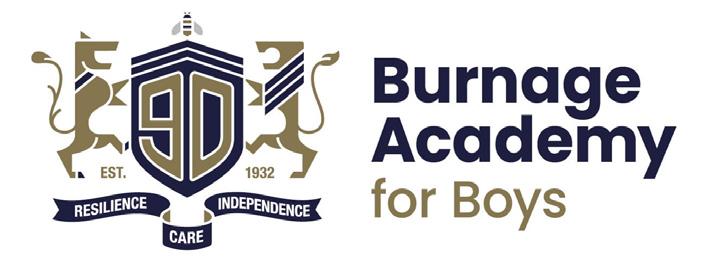

Burnage Academy for Boys in Manchester was founded in 1932 and has changed name several times over the years – most recently in 2014 when it became an academy and changed its name from ‘Burnage Media Arts College’.
At that time the school logo included media symbols such as ‘play’ and ‘pause’, which weren’t suited to the new name. A new logo was created internally which was inspired by the worker bee symbol of Manchester and the distinctive design of the new school building.
However, the colours didn’t reflect the school uniform or include the key values or history of the school, and it wasn’t easily recognisable, so the school decided to use its 90th anniversary this year to ‘test the water’ with a new logo that would more effectively represent the school.
A team of design experts from WDC Creative worked with GCSE art students and members of the pupil media team at Burnage to develop a new concept, working to a brief set by the school leadership team. This involved historical research, an understanding of branding and marketing theory and a site tour to pick up ideas and references including the original stone crest which still sits within the school grounds.
WDC then set the students a creative challenge to visually represent the key strengths of the school and to suggest ways to improve the current branding. The design team reviewed the input and presented several potential creative routes, as well as showing how their ideas might work on the school’s uniform.
The students involved felt honoured to be taking part and creating a legacy for the school, according to Greg Morrison, associate assistant head at the school. They also picked up some real business skills; ‘For example, the need to compromise and work as a team’.
The new logo was rolled out across the school as part of the 90th anniversary celebrations (you can see the explanatory video at https://www.youtube.com/ watch?v=JvBlOukEX-o) and is now being used across the school’s digital communications.
Feedback so far has been overwhelmingly positive from staff according to Greg – and ideas are being developed to continue to use the new brand once the 90th year is over, taking into account the need to keep costs to an absolute minimum.
22 January 2023 MANAGEMENT MARKETING
The students involved felt honoured to be taking part and creating a legacy for the school
Top: Burnage Academy for Boys students working with designers from WDC Bottom: Finished logo
Fire safety in your school
PHIL
BURTON, SBM
at Hallbrook and Cosby Primary Schools, uses his recent experience to summarise some of the key points

As I sit to write this article
I am completing the NEBOSH Fire Safety Certificate and am thinking about all the things that I now need to review, or implement, across my schools. To be honest, we are not in a bad position; in fact, I would go as far as to say we are in a very good position. However, attending this course has made me think about things - so, with that in mind, I felt it might be a good write up to share the detail of what I found.
Firstly, have you ever heard of the Regulatory Reform (Fire Safety) Order 2005? (RRFSO) Of course you have, I hear you say. This is the legal framework which details everything you need to know and do in order to comply with fire safety. The document is 68 pages long - and I have read every word on every page.
Your school will have a responsible person, usually the headteacher who is accountable for ensuring that every detail of the RRFSO is adhered to. They are the ones who, if you have any shortcomings, will face prosecution (depending on the severity of the incident). They have in the region of 50 articles to ensure are met in your school. It is impossible for me to go through
everyone one, but here are the five key bits I think are worth knowing.
1
You must complete a suitable and sufficient fire risk assessment for your premises. In most cases this will be someone with experience and suitable knowledge. It should be reviewed annually internally and then either every five years externally or if major changes occur to the building or people within the five-year time frame.
2
You must have detailed evacuation procedures which are shared amongst the staff of the school, so they all know what to do in the event of an emergency. These procedures should be tested at least twice a year although most schools will do this termly in the form of a fire drill. Remember to log and record any pointers to improve and demonstrate that you have carried them out.
3
Whilst in and around the school make sure that your corridors and escape routes are kept clear from obstruction at all times. Do you check that the fire doors are all open, even the ones that never get used?
4
In the event of a fire make sure someone goes to meet the fire brigade and they take with them the grab bag which has all the key pieces of information the officers will need - floor plans, areas where there may be higher risks, such as LPG cylinders, locations of utility mains switch offs and anything they may find useful.
5
Ensure you are doing some training with your staff on fire safety. This will be in the form of induction, annual refreshers, and then feedback after incidents such as drills. Make sure you keep a log of the training to demonstrate to the officers that it has been happening.
These pointers are just the tip of the iceberg when it comes to fire safety –there is so much more that needs to be done and everyone should play a part in ensuring the safety of others. Whilst fire is relativity uncommon, it does happen, and you want to make sure that everyone gets out safely when it does.
You can find more of your responsibilities by searching the RRFSO2005 and reading through everything that is needed.
Do you check that the fire doors are all open, even the ones that never get used?
he has learned about fire safety
23 January 2023 MARKETING MANAGEMENT
New year resolutions
As we stride forth into a new year (2023 already!) I am always tempted to make new year’s resolutions, both personally and professionally. Whether they be about health, vanity, or finances, they never last, and I have to say my professional ones don’t either.

So this year is going to be different. I am not making resolutions - I am going to be SMART about it. Gone is the target-setting approach which gives deadlines that are often impossible to reach, again in both my personal and working life. In its place I will be putting something with more of a direction and includes an aspirational aim which is both specific, measurable, achievable, relevant and time-bound.
It is fair to say that, for some of us, the personal and professional may
well intermingle. Often a desire to achieve something new brings with it an opportunity for change resulting in new ways of being and working. Change is not easy, and self-induced change can be even harder but, as Winston Churchill once said:
“To improve is to change; to be perfect is to change often”
So, having made this decision to change my approach to entering the new year, the next question has to be ‘What does this look like?’

School business leaders have very hectic professional lives; the nature of the role assumes, often correctly, that the sort of person who thrives in this position is one of life’s ‘busy people’. This is certainly true of myself and most SBPs I know; it’s what allows us to manage so many different areas at the

same time without ‘dropping the ball’.
SBPs tend to be influencers who champion change, who are capable of holding an operational and strategic outlook on a daily basis, and enjoy having lots of responsibilities. The downside of this is that it is hard to keep to a plan; you are often chasing your tail and go home every evening with an extensive list for the next daycompleting a list happens, never! This often results in working at home, adding to what, for many, will be an already overloaded personal schedule.
We are also not good at considering our own wellbeing, which is quite comical as we are usually at the centre of looking after everyone else. In light of this, my aspiration for this year is to have some guiding principles that I stick to which will ensure that, at least
24 January 2023 MANAGEMENT RESOLUTIONS
SUE BIRCHALL, long-standing SBL, explains why she is doing her new year resolutions differently this year
to some degree, I manage my own wellbeing and working practices more effectively to get rid of some of those sleepless nights. How can I achieve this, I hear you ask?
FIRST GUIDING PRINCIPLE
There is no failure, only an opportunity to improve. This approach means that you cannot ‘fail’ in any of your targets. Achieving this is easier said than done, and will require a change of mindset. Accepting that we aren’t invincible - only a human who will make mistakes and is not infallible - does not come easily.
CREATE AN ACHIEVABLE HOME/WORK BALANCE
The completer-finishers amongst us will find this extremely hard but we all know how important it is to separate
home from work. Equally, having a strict rule where you never take work home is counter-productive so you must set what is right for you.
MANAGING YOUR TIME
Ha! I hear you all cry and it is true that our work time when others are there is often taken up with all manner of issues. The pandemic taught us that flexible working does actually succeed so maybe try to have a day working from home, swap some of your holiday time if you are term-time only, or even just try leaving early once or twice a week.
PROCESS
This is a big one for me and at the top of my list for this year. I truly believe that there is nothing that cannot be solved by a process. Getting people to
follow that process is another story, but sticking to processes, and not colluding with people breaking them, will eventually reap rewards. We all know that when a process is successful, it saves time, money and angst.
RESOURCES
This may sound like an odd one but how often have you ‘just managed’ because someone else needed something, or not asked for something that would make your life easier because of the cost - and I mean this professionally and personally. This is about realising your value and that you are worth investing in.
I could go on but, hopefully, you get the idea and by the time you read this I will have already started!
I wish you all the best for a happy and prosperous new year. Have fun!

25 January 2023 RESOLUTIONS MANAGEMENT
To improve is to change; to be perfect is to change often
SWITCHED ON

















The latest news and views from the world of ICT and edtech





Acquisition adds up for Cambridge edtech Blutick







































As seen on Business Weekly, AQA – the UK’s leading assessment organisation – has acquired Cambridge-based AI platform Blutick which supports the teaching, learning and assessment at Key Stage 3, GCSE and A-level maths. Blutick, founded by Rob Percival in 2019, and backed by Cambridge Angels, has developed an innovative teaching and learning app and online mock tests for mathematics’ students in the UK.



The AI-driven app features functionality that guides students through mathematical concepts, reviewing and correcting their workings and responses to maths questions in real-time.




Students are also supported with access to worked examples and video tutorials, as well as exam practice materials. Key features include live student monitoring, auto-marked tests and line-by-line analysis of typed answers. The app is designed to reduce teacher workload and deliver meaningful reports on student progress and attainment.

AQA will provide the app and online mocks to schools and colleges, and they won’t be charged separately for these resources. It will continue to power the app with new question items and enhanced functionality.




Somerset mental health charity concerned about children and young people on social media
A Somerset charity believes social media is contributing to poor mental health among the children it supports, BBC News has reported. The Space works with 10 schools in the Wessex Learning Trust and said 76% of the children it works with have anxiety, while 54% have depression, and 41% have had suicidal thoughts.
The charity said parents were “at a total loss” as to how to support children online, but a psychiatrist says “the jury is out” on social media’s health impacts. “There is some evidence to show that social media has a negative impact on particularly teenagers,” said Dr Tim Williams, former medical director of specialist service at the Avon and Wiltshire Mental Health Partnership, “but there is some evidence to show there is no detrimental effect. So, at the moment, the jury is out.”
ICT MATTERS NEWS
26 January 2023
Jacobs Foundation calls for
‘culture shift’ in UK edtech industry



FE news has reported that The Jacobs Foundation has called on investors, edtech companies and academia across the UK and around the world to deepen their collaboration and integrate more research in the development of new edtech products. The foundation also urged edtech venture capital funds to make greater use of evidence in investment decision-making, after UK edtech start-ups received a combined total of $609m in venture capital funding last year - more than start-ups in any other European country. It is estimated that the UK now attracts over 40% of all edtech investment in Europe.
The Jacobs Foundation made this call ahead of the World Economic Forum annual meeting in Davos, where world leaders will convene under the theme, ‘Working together, restoring trust’. They will look at the role of public-private co-operation in rebuilding trust and shaping a more sustainable future. This comes after the pandemic disrupted learning for more than 1.5bn students throughout the world.
UK edtech has been gaining momentum in recent years. The sector grew a staggering 72% in 2020 and is now worth upwards of £3bn.
The Guardian has reported that risky and criminal online behaviour is in danger of becoming normalised among a generation of young people across Europe. The EU-funded research that found one-in-four 16 to 19-year-olds have trolled someone online and one-in-three have engaged in digital piracy.
The study found evidence of widespread criminal, risky and delinquent behaviour among the 16-19 age group in nine European countries, including the UK. A survey of 8,000 young people found that one-in-four have tracked or trolled someone online, one-in-eight have engaged in online harassment, one-in-10 have engaged in hate
speech or hacking, one-in-five have engaged in sexting and onein-three have engaged in digital piracy. It also found that four-outof-10 have watched pornography.



Julia Davidson, a co-author of the research and professor of criminology at the University of East London, said risky and criminal online behaviour was becoming almost normalised among a generation of European young people.
“The research indicates that a large proportion of young people in the EU are engaging in some form of cybercrime, to such an extent that the conduct of lowlevel crimes online, and online risk-taking, has become almost normalised,” she said.




NEWS ICT MATTERS 27 January 2023
Risky online behaviour ‘almost normalised’ among young people, says study
How to evaluate your IT provision
NEIL LIMBRICK, partner and IT consultant, Limbrick Consultancy LLP, founder of theEducationCollective and ambassador for the Association of Network Managers in Education (ANME), shares his expert advice on


There is an old joke that crops up from time-to-time – ‘Words cannot describe your beauty, but numbers can; six-outof-10.’ This is a great demonstration of how selecting the right way to evaluate information can determine how successful it will be.
As a full time IT consultant for the education sector, I have to quickly evaluate elements of a school’s IT provision. Systems, people and vision all play a part in working out where to invest time and money. Initial questions like, ‘What keeps you awake at night?’ or, ‘What works really well?’ help unearth issues and highlight individual perspectives on the provision based on what is important to the school.
Over time I began to realise there are three key zones; this applies to everything from use of software, like your MIS, to staff effectiveness or investment in equipment.
The three zones then form a development timeline:
CRISIS MANAGEMENT – if you have ever had to think about whether to use a system because it might not work then this sits squarely in the crisis management zone - or if you spent money on something that is not being used - like interactive screens/white boards.
STABLE AND RELIABLE – at this point the provision is effortless to engage with and you do not give using it a second thought. It does exactly what you expect it to and provides everything you believe you invested time and money to get.
VALUE ADDED – sometimes a product or service exceeds our expectations; it not only achieves what you set out to do but it also does a whole lot more – giving you the maximum value out of your investment.
A specific example could be Office 365.
When you adopt an eco-system like O365 there are teething problems –staff need to learn and engage, filters and other settings need to be adjusted
to get the flow of email right. At this point you are somewhere to the left of stable and reliable to some degree. Then you get the hang of the system as an organisation and people use O365 for email effortlessly with some people, perhaps, using it for saving files to the cloud. Email is the most common reason people adopt O365 and so, at this point, you are squarely at ‘stable and reliable’.
If you then seize the opportunity to use some of the additional features like Forms, Teams or Sharepoint, you are really getting the maximum value out of the system and probably save money from not having to have other solutions in place, or even ditching on site servers completely.
Hopefully, none of the provision in your setting is to the left of ‘stable and reliable’ but, if it is, then this is probably the first thing to address. Beyond that it is about looking for the opportunities, perhaps balanced with likely impact, and with a strong influence from your school development plan.
ICT MATTERS IT PROVISION 28
January 2023
how you can effectively evaluate the IT provision in your school
Techno Geek
Save timeautomate your admin
Does your school use Google Workspace or Office 365? The constant demands of creating new users, or keeping track of who has left the school, can add even more to your already busy workload. I have discovered recently how many school business managers and other members of staff are managing the users in these systems. Why isn’t your IT support provider doing this as part of the service they provide? Here’s a simple answer.
The IT support team will, in most cases, happily manage the Microsoft users as part of the Windows server/ clients that they love so much and don’t ever want to change; in many cases, they won’t entertain the idea of looking after a Google Workspace domain because there’s so much that can be done with Google to enhance and improve the overall experience in school.
There will have been many occasions where a new pupil has started, and nobody has informed you then, over a week or so later, a
teacher will message you to ask where the login details are for this new pupil. Reflecting on my own experience of this process, you are 100% reliant on key members of staff telling you who is starting and leaving.

As you all know, life in school is so hectic and, even with the most organised processes and reminders in place, it’s so easy to overlook things. Automated sync tools should remove issues such as this and ensure that pupils and staff quickly have access to everything they need. The same efficiency works the other way too; when a pupil leaves and has been updated as having left in the MIS, their account in Google/Microsoft will be changed accordingly.
HOW DO WE AUTOMATE THE PROCESS?
There are a couple of excellent options to consider. Wonde and SalamanderSoft provide great tools that allow you to automate the creation of new pupil and staff users once they are in your MIS. They have Google and Microsoft Sync Tools
that, once set up, will create users based on the preferences you create. Their data management solution has been designed and built to integrate seamlessly with school MIS packages, ensuring data is securely maintained, managed and accessible. By continuously acquiring updates from schools and apps, you can be assured your data is accurate and timely. When it comes to protecting your data, they have comprehensive security and compliance processes in place, employing industry-standard practices and organisational control, so you can be confident that they will protect and defend your data. Wonde and SalamanderSoft also provide many other sync services which can make a massive difference for your school. It’s certainly worth considering these solutions. They are affordable and, when you factor in the time saving element for your staff, the return on investment will be huge.
NIGEL MILLIGAN, IT manager to schools and businesses, gives his advice on how you can automate processes in your school to minimise your already busy workload
TECHO GREEK ICT MATTERS 29 January 2023
The automated sync tools...ensure that pupils and staff quickly have access to everything they need
LIVE IT
Time to take a few moments out for some light and interesting reading – a wellearned break from numbers and statistics!
Deep-sea discovery
Scientists have discovered a new kind of seaweed 100 metres below the surface of the Antarctic Ocean, says BBC News. Researchers found the red algae, palmaria decipiens, and successfully collected samples to examine further. The team, including researchers from the University of Aberdeen, found the seaweed using a remotely-operated vehicle (ROV).

Researchers say the discovery is “important for furthering our knowledge of Antarctica”. The seaweed was discovered by a team of researchers working at the Rothera Research Station on Adelaide Island, off the south-western Antarctic Peninsula. The project, funded by the UK Natural Environment Research Council, set out to clarify the maximum depths that seaweed could grow in Antarctica, using a ROV dispatched from a small boat. DNA sequencing was then used to confirm the types of seaweed found.
LIFE HACK
We’re sure you’re stocking up on sweet-smelling candles to make your home extra cozy for the colder months but, if your candles are burning too low to reach the wick, there’s no reason to go without your favourite scent. Instead of burning your fingers, light a piece of uncooked spaghetti to reach right into those deep candles.

Caption competition
Pub quiz
1. Which football club plays its home games at Loftus Road?

2. Continental United States has four time zones; can you name them?
3. What was the Turkish city of Istanbul called before 1930?
4. From which US city do the band The Killers originate?
5. Name the coffee shop in US sitcom Friends
4. Las Vegas 5. Central Perk
Answers: 1. Queen’s Park Rangers 2. Pacific, Mountain, Central, Eastern 3. Constantinople
Let us know your funny caption ideas by tweeting us @edexec

LIVE IT TEABREAK January 2023 30
DID YOU KNOW?
The speed of a computer mouse is measured in ‘Mickeys’. A British scientist first invented the roller-ball device in 1946, while working for the Royal Navy, but the word ‘mouse’ wasn’t coined for it until 1965.

“ “

A baby otter is being cared for after being rescued from the side of a busy road, BBC News has reported. The baby otter was found near Monymusk, in Aberdeenshire, as traffic missed her by inches. Her rescuers wrapped her in a towel and took her to safety after advice from a local animal charity; she will remain at the New Arc rescue centre, near Ellon, for at least the next 12 months.

“We found her at the side of the road,” said one of the original rescuers, Laurie Lee. “It was dark;
she wasn’t running away, and passing cars were only narrowly missing her.” The otter - now named Baby Belle - is thought to be about five weeks old. “She is on a specialised formula substitute milk and will soon be introduced to a milky fish soup,” explained Keith Marley of New Arc who offered guidance on what to do. “She will remain here at the centre for at least the next 12 months. Once she is old enough to be weaned, and on a fish diet, she will be introduced to one of our otter enclosures.”
A POTTY RESCUE
As reported by Sky News, an evening of potty training went badly wrong after a toddler got her head stuck in a toilet seat. Kay Stewart, 37, had been trying to potty train her two-year-old daughter, Harper, at their home in Wallsend, North Tyneside. However, the toddler decided to try to wear the seat around her neck and got into difficulty, crying, “Mammy, I’m stuck.”
Ms Stewart’s efforts to get the seat off were unsuccessful and, in desperation, she asked her 16-year-old daughter Shannon to call for help. Tyne and Wear Fire and Rescue Service dispatched a crew from Wallsend Community Fire Station and arrived within minutes. They used small tools to remove the potty, and amused Harper’s siblings with the blue lights on their fire truck.
TEABREAK LIVE IT 31 January 2023
The journey of a thousand miles begins with one step. Lao Tzu
Well, knock me down with a feather!
THUMBS
UP!
Otter spotter
What to do when it is ‘notsuch-a-crisis’


Plans and preparation are vital, should the worst happen, but more often it is the lesser events which occur where schools could really use a formal procedure. EMMA GRAY, chief finance and operations officer, explains why she is developing a ‘not-such-a-crisis’ plan for these moments

Although I sometimes yearn to pack my bags to go and live the life of a remote hermit, I’ve so far resisted the urge. Something about a small stone hut on the side of a lake with civilisation way over a mountain is very appealing, but the desire to remain accessible to my family, embrace the challenges of work, and take a daily hot shower keep me grounded.
This is the sort of thought process I go through at the beginning of a new year. What’s in store? Where am I heading? What
are the priorities on my to-do list? Could I escape it all?
I do like January - it’s an incredibly positive month. It feels fresh, like a clean start. It’s a time to wait patiently for the spring bulbs, plan for the year ahead, use a small space window to review policies and procedures and, of course, there is always that thrilling chance of a few snow days.
Last year, we had a snow day with an unexpected fall on a Sunday in midDecember. It was lovely, for a few minutes; then it became a day of messaging what-ifs,
LIVE IT PROFESSION PROGRESSION January 2023
32
can-we’s, and how shall we’s? Inevitably (and necessarily) the decision was left to the last possible moment, but then glitches in the systems needed to be dealt with. It was not a fun day. I don’t like texting staff at nine p.m. asking if they could just sort something out.
One of the problems I find with emergency, business continuity and crisis management plans is that we only think to use them in a major crisis or emergency. Of course, the plans and preparation are vital, should the worst happen, but more often it is the lesser events which occur where we could really use a formal procedure.

So, I’m thinking of introducing a ‘notsuch-a-crisis’ plan in my trust. This plan will lay out a procedure for a minor, but unusual, event which requires the input of key members of staff. It will list who is needed and how we will communicate; it can draw on experience of previous events and we can review and update it after the event. It will mean we have a record of the
event and ensure responsibility doesn’t fall on one person. We can also put in some clear succession should, for example, senior staff be out of the country.
I’m thinking my ‘not-such-a-crisis’ plan could be used for:
● Unexpected snowfall or other inclement, weather-affecting, operations.
● Power, heating, or water failure.
● Moderate-to-high levels of absence among staff and/or students.

● An incident on a school trip.
● Damage, however caused, to buildings or equipment.
● An incident on site during school holidays.
I’m sure you can think of lots of other occasions in your school when a checklist would have been helpful, meaning staff involved had prior warning of when they would be needed and dare I say, when they wouldn’t! The key headings in my plan are going to be:
● Who will be involved? (My advice is keep it
PROFESSION PROGRESSION LIVE IT 33 January 2023
It is the lesser events which occur where we could really use a formal procedure
to a minimum).
● How are those involved going to communicate with each other?
● Who is required to advise on the decision?
● Who is required to make the decision?
● Who leads on communications to staff/ parents/students?

● Who supports the communications? (From a technical point of view.)
● Who reviews the event and updates the plan?
This sounds so simplistic and obvious but, for us and our recent Sunday snow day, it would have saved a lot of time, minimised avoidable delays and resulted in targeted support and clear communications. It would have also given us an evidence record, should it be needed.
Of course, we managed, we got the job done and the communications out. The
outside world wouldn’t have seen anything other than serenity as we swept into action and got it all sorted. From the inside, I would just have liked a bit more structure and targeted input. Thankfully, major incidents are rare, but those small ones which seem to test us on a regular basis could, I think, be supported by some small formality and overall awareness.
I want to wish a happy new year 2023 to all school business leaders across the UK, and beyond. For me, 2023 is going to be a year of significant change in the colleagues I work with and how I execute my role in my trust. It’s exciting, but daunting at the same time.
I really want to streamline my dayto-day and become more organised, so I’m ready when those unusual events take place. How do you manage the ‘not-such-acrisis’ in your school?
January 2023 34 LIVE IT PROFESSION PROGRESSION
I’m sure you can think of lots of other occasions in your school when a checklist would have been helpful








A LEADING PROVIDER OF COMPLIANCE AND HR MANAGEMENT
FOR THE EDUCATION SECTOR.
TO MAKE YOUR WORKING LIFE SIMPLER.
HR: From staff absence management
ability to manage and support your employees
EVERY COMPLIANCE: With our
requirements with ease. Start your Every journey today: hello@weareevery.com Every allows you to: Have consistency across multiple sites and
compliance system Set compliance standards
trust
Have
Holistic
SOLUTIONS
SOFTWARE
EVERY
to payroll reporting, you have the
from one central place.
ever-growing modules to choose from, manage all your compliance
a true end to end
at
level View a variety of compliance areas centrally such as health & safety, risk, policies etc.
real-time RAG reporting with drill-down functionality which removes the need for cumbersome, time-consuming spreadsheets Have a helicopter view of key information with the multi-site dashboard, which gives you the ability to drill down into the granular detail Centralise all your information with one HR system and set trust-wide standards Manage trust-wide pay scales with the MAT admin functionality
“EdExec LIVE is a great way to network with other colleagues in different authorities, when you return to work you feel you are not alone juggling your workload. The whole day was very well organised with very interesting seminars and had a good range of outside agencies with interesting products.” – 2022 delegate




2023
Visit www.edexeclive.co.uk to learn more A day of interactive learning and networking specifically tailored to the role of the SBL WE’RE BACK ON MAY 18TH IN MANCHESTER AND JUNE 7TH IN LONDON Flag your interest for discounted tickets by emailing hello@ edexeclive.co.uk Standard ticket price is £50 which includes all seminars, exhibition, refreshments and a hot lunch













 ELEANOR POTTER
ELEANOR POTTER
























































































































